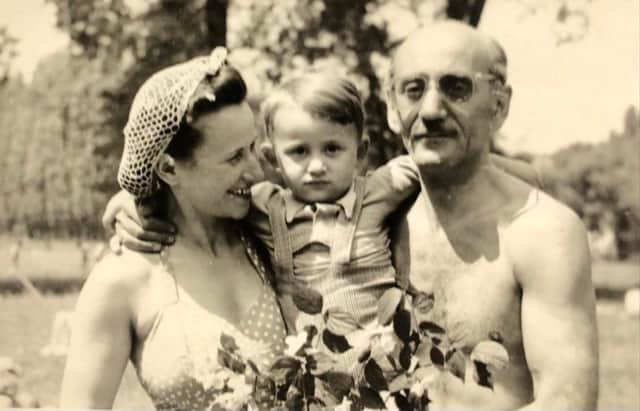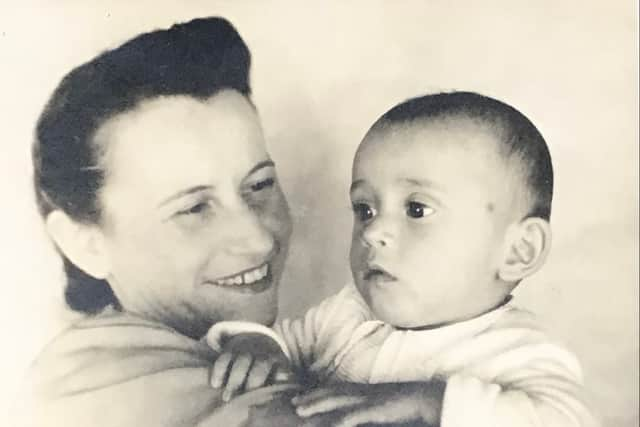Holocaust survivor says its ‘beyond belief’ that there is still Holocaust denial in the world
and live on Freeview channel 276
A Holocaust survivor says it is “very unsettling” that there are still Holocaust deniers as the world marks 79 years since the liberation of the Auschwitz-Birkenau death camp.
Tom Keve, 79, was just a baby when the German army invaded his country and has no recollection of the war but recalls his family history in great detail.
Advertisement
Hide AdAdvertisement
Hide AdTom was born in Budapest in 1944, just after the Nazis entered Hungary. In just a few weeks of that fateful year, more than 400,000 Hungarian Jews, including many of his extended family, were deported to Auschwitz-Birkenau and murdered.
In Budapest, thousands of Jews were marched to the Danube and murdered on its banks by the Arrow Cross, Hungarian Fascists. 100,000 Jewish men were called up for forced labour, including Tom’s father, many of whom did not return alive.
In June 1944 the family were forced out of their home and all their possessions were impounded.


Tom’s father was in a forced labour camp and the rest of the family moved to a building designated for Jews only (a so-called yellow-star house), wore yellow Stars of David and had to abide by a curfew.
Advertisement
Hide AdAdvertisement
Hide AdHis mother was carried off by the Hungarian gendarmerie but managed to escape and return.
Later Tom’s family managed to get a Schutzbrief, a collective passport issued by Carl Lutz of the Swiss Legation in Budapest, which provided a degree of protection for a while.
Tom’s mother and siblings were then able to enter a Swiss Red Cross protected house. Although conditions were terrible, they were safe for a time.
Tom’s father escaped from the forced labour camp and, with help of a friend, acquired false, non-Jewish identity papers in a new, Gentile-sounding, surname. He was able to take the rest of the family from the Red Cross house to live outside the ghetto with Gentile identity papers.
Advertisement
Hide AdAdvertisement
Hide AdDuring the siege of Budapest by Soviet forces, the family, like many others, were without food for an extended period. Tom, 8 months old at the time, was extremely ill, with tuberculosis, pneumonia and starvation. He was not expected to survive, but miraculously, pulled through.


Post war, Tom had a ‘normal’ childhood in Hungary until the Communists came to power, when their business was confiscated.
In 1956, after the Hungarian uprising he and his family escaped and were able to come to the UK as refugees. Tom was then 12 years old.
“My growing up really was as a child in communist country. I always say I had a good childhood. We were deprived of a lot, but it was the same for everybody else,” Tom told LondonWorld.
Advertisement
Hide AdAdvertisement
Hide Ad“It was very hard for my parents to make ends meet. But for me, it was okay. I went to school.”
Tom said that he didn’t experience any persecution as a Jew growing up in Communist Hungary as religion was “frowned upon.”
“People stopped going to church, and, of course, the synagogues. And the Secret Police will be outside taking names.
“We were persecuted in a completely different sense. Under Communist rule my father had his business taken away from him.
Advertisement
Hide AdAdvertisement
Hide Ad“You have a black mark against your name as a capitalist. And that meant you were discriminated against, but not as a Jew, but as a capitalist.”
Tom’s family came to London in 1956 amongst 20,000 other refugees who were escaping the Soviet Union.
“We went to my aunt's place, which was in London and we slept on her floor until my parents were able to get jobs and I went to school when the term started in January,” he recalled.
“My father was overjoyed, felt liberated, very free to be in a free country when nobody was going to persecute him either as a Jew or as a capitalist, or for no reason at all.
Advertisement
Hide AdAdvertisement
Hide Ad“My mother, unfortunately, became very depressed because she lost all her roots. And it took her years before she kind of emotionally settled down.”
Tom went to school and went to study physics at University, followed by a PhD in crystallography at Imperial College London.
He went on to live and work in the USA, Holland and France as a research scientist. He has also written three books.
Tom lives in north London with his wife Gillian and has two sons and five grandchildren.
Advertisement
Hide AdAdvertisement
Hide Ad79 years on from the liberation of the Auschwitz-Birkenau death camp, Tom says it is “unsettling” that there are still Holocaust deniers in the world.
“Humanity doesn’t really learn. To see that there is Holocaust denial in the world is beyond belief,” he said
“How can you, after 70 or 80 years say something is doubtful whether it has happened. It's not enough that there are live witnesses, that there are government records, there are cemeteries, there are photographs and films, and camp records, people still deny that it could happen. So that is very unsettling.”
Holocaust Memorial Day falls each year on January 27, the day when Auschwitz was liberated by the Red Army in 1945, and is also intended to remember the victims of more recent genocides.
Comment Guidelines
National World encourages reader discussion on our stories. User feedback, insights and back-and-forth exchanges add a rich layer of context to reporting. Please review our Community Guidelines before commenting.
